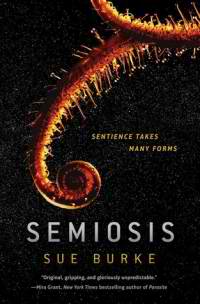
Published by Tor Books on February 6, 2018
In its infancy (both in its Golden Age and for years thereafter), science fiction took human supremacy as a given. Humans were viewed as superior to aliens and were destined to prevail in conflicts. A few writers (Clifford D. Simak among them) took a contrary approach, writing stories in which aliens had a lot to teach stupidly aggressive humans, but even today, the notion of human supremacy is alive and well in science fiction.
The best science fiction asks us to question our assumptions. Semiosis questions the assumption of human supremacy without denigrating human nature. Two forms of alien life come into contact with a human colony. One faction of humans condemns both alien species because, well, they aren’t human. A competing faction argues in favor of mutualism. Neither perspective is presented in a simplistic way, giving rise to the kind of debate that invites the reader to decide how humans might best interact with intelligent nonhuman aliens, if and when we meet them.
The first alien life form is a sentient plant, or more broadly, the most intelligent plant in an ecosystem. Different kinds of self-aware plants with varying degrees of intelligence communicate with each other chemically. Other life forms on the planet (flippokats are fun, flippolions less so, and bats have rudimentary language) interact with humans, but only the plants manipulate them.
Fifty human colonists on a distant world called Pax want to create a place that exists in harmony with nature. Global warming is ravaging Earth, so the colonists are looking to do better than the humans they left behind. They have a fine constitution dedicated to peace, freedom, and equality. Of course, by the time the second generation matures, the first generation has become repressive, outlawing time-wasting notions like art and forcing women to breed. Such is the nature of humanity; fine ideas give way to our worst instincts when things aren’t going well.
The novel follows the human colonists through seven generations. Each generational chapter is narrated by a human from that generation. The question for each generation of colonists is whether the plants can be trusted. Plants can synthesize chemicals, but chemicals can be beneficial or toxic. Will humans control the plants, will plants control the humans, or will plants and people work together to attain their mutual goals? The reader is likely to revise tentative answers to those questions repeatedly as the story moves forward.
The second generation comes upon a city in which glass has clearly been shaped as art and for utilitarian uses. The colonists dub the city’s original inhabitants “the Glassmakers,” but humans do not encounter an actual Glassmaker until later in the story, after the first few generations have become part of colonial history. The Glassmakers are the second alien race to interact with the human colony, but they seem to be more primitive and confrontational than the beautiful city they left behind would suggest.
Whether the Glassmakers are good or evil is no more easy to answer than whether humans are good or evil. Forgiveness is, for some, a human virtue, but we sometimes find it easier to forgive ourselves and our friends than people who are not in our own circle. Can we learn to forgive aliens for their harmful behavior, even if their behavior was based on a misunderstanding of humans? Will they forgive us for misunderstanding them?
Understanding another human is difficult enough for humans; understanding an alien might be an impossible task. Semiosis suggests that it is a task that, at best, will require multiple generations of effort on the part of both humans and aliens. But in the end, understanding the universe and all of its inhabitants is worthwhile, and the need to pursue understanding rather than conflict is at the heart of the best science fiction. Semiosis easily falls into the category of “the best” science fiction. In the depth of its story and of its characters, Semiosis is award-worthy.
RECOMMENDED